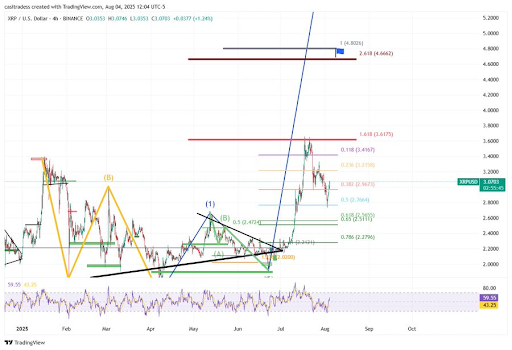US Securities and Exchange Commission (SEC) Commissioner Hester Peirce informed an viewers of blockchain researchers and practitioners on Monday that lawmakers and regulators want to guard folks’s proper to transact privately.
Her feedback come as Roman Storm’s Tornado Cash trial heads towards a verdict.
Peirce mentioned in a speech on the Science of Blockchain Conference that privacy-protecting applied sciences and the correct to self-custody crypto needs to be safeguarded, together with the rights of builders of open-source privateness software program, who shouldn’t be held answerable for how others use their code.
“We ought to take concrete steps to guard folks’s capacity not solely to speak privately, however to switch worth privately, as they may have finished with bodily cash within the days through which the Fourth Amendment was crafted,” she mentioned.
“Although a centralized middleman or perhaps a DAO deploying a DeFi software may construct in restrictions on its use, an immutable, open-source protocol is offered for anybody’s use in perpetuity, so requiring that it adjust to monetary surveillance measures is fruitless.”
Peirce’s feedback come amid jury deliberations within the trial of Roman Storm, co-founder of the crypto mixing service Tornado Cash, which permits customers to masks the origin and vacation spot of cryptocurrency from prying eyes.
Stifling privateness applied sciences slows innovation
In the Nineteen Nineties, governments, for nationwide safety causes, needed to maintain sturdy cryptography out of personal fingers, in keeping with Peirce.
She famous it took courtroom circumstances and pushback from cryptographers resembling Phil Zimmermann — the developer of Pretty Good Privacy (PGP) encryption software program — to show the tide, resulting in many technological developments.
“The web couldn’t have succeeded with out sturdy cryptography, so a decided set of cryptographers pushed again and satisfied the federal government that cryptography in non-public fingers was a web constructive,” she mentioned.
“Because of their hard-fought victory within the courts and the courtroom of public opinion, we every day depend on encryption to ship e-mail, have interaction in on-line banking, purchase from on-line retailers, talk with each other via voice and video, and conduct many different every day duties.”
DeFi dealer rule ought to keep lifeless
In the identical speech, Peirce additionally mentioned that regulators shouldn’t be asking companies to maintain a report of who they or their clients transact with, as was practically enforced by the so-called decentralized finance (DeFi) dealer rule.
Related: CFTC begins ‘crypto dash’ with SEC following White House plans
“Doing so would deputize us to surveil our neighbors—a observe antithetical to a free society. Nor ought to we require an middleman to step in the course of peer-to-peer transactions,” she mentioned.
“As with the web, applied sciences which have reliable makes use of are higher left within the permissionless, available-for-all-to-use class, although doing so permits folks to make use of them for dangerous functions, as a result of taking some other course would impinge basic liberties.”
Before US President Donald Trump killed it on April 10, the Biden administration-era DeFi dealer rule would have required DeFi protocols to reveal gross proceeds from crypto gross sales, together with info relating to taxpayers concerned within the transactions, to the Internal Revenue Service.
Crypto mixers on trial
Storm is standing trial within the Southern District of New York over allegations that felony parts used the blending service for cash laundering and that Storm is answerable for facilitating their actions. If convicted, he may withstand 40 years in jail.
Storm’s defence group and the business argued that Tornado Cash, like several instrument, can be utilized by each regular residents and dangerous actors and the software program builders shouldn’t be held answerable for the actions of others.
In an identical case, the co-founders of Samourai Wallet are going through expenses stemming from their involvement within the crypto mixing protocol. They opted to plead responsible on July 29 after initially attempting to get the case dismissed.
Magazine: Robinhood’s tokenized shares have stirred up a authorized hornet’s nest










